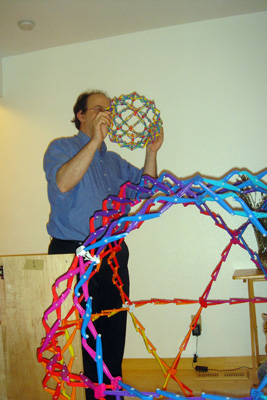
The other day we went to downtown San Jose and it was so boring there. Poor old San Jose. No matter what improvements the city tries, you can look down two, three, four blocks of sidewalk ahead and see nobody on it whatsoever.

I decided fuhgeddaboutit being a loyal San Jose booster and featuring it in my Postsingular novel. I was gonna set it in SJ, but, come on, I’m changing it to be in San Francisco where there’s some action.

[Sculpture in SJ Museum by someone living in Los Gatos.]
I read an article in the New Yorker about some kid in, like, Nebraska. His parents fell into the orbit of a “gifted children” counsellor (whom the article seems to depict as something of a con-woman) who told them their son had an IQ of 182 — although apparently the numbers don’t mean much when you get past 170.
And the parents flipped out over that number, and didn’t let him go to school with other kids, feeling it would be too “slow” for him, as if school were about learning facts instead of being about socialization and getting the hell out from under your parents’ eyes. And the poor kid got depressed and killed himself. Not that the suicide is necessarily the parents fault; it might well have happened no matter what they did. Brain chemistry gone awry. A sad story.

The relevance for my novel is that the article quotes some people nattering on about how very strange and different it is to have an unusually high IQ.

[Sculpture of “Dalilah” [sic] in the new SF De Young museum.]
My programmer friend John Walker suggests that IQ might more likely be proportional to the log of one’s brute processing power rather than being a linear function of it. So a thousandfold increase in processor power would make you only three times as smart.
That sounds right; just think of a desktop machines. A gigaflop machine isn’t a thousand times as good as a megaflop, it’s more like three times as good. So it would take a hundred-thousand-fold increase in brain power to get to five times as high an IQ, that is, to jump from a high end of IQ 200 to a high end of a thousand.

[Toon-like 20th C African mask in the new SF De Young museum.]
I’ll call the kiloIQ people “kiqqies”. I love the word kiqqie, it’s “kiddie” with some letters upside down. The kiqqie kiddies. Wow, Mom.
In my novel, I peg an individual human at the exa or 10^18 flop-and-byte level and the entire orphidnet at the ubba or 10^36 level. If IQ goes up as the log of the flop-and-byte, that’s an eighteen-fold amplification of normal IQ, which turns the usual IQ range of 100 to 200 into a range of 1800 to 3600. Two or three thousand for the IQ, in other words.

[Mexican ceramic of chihuahas mating, dated 300 BC to 300 AD in the SF De Young museum. Mexicans and chihuahuas go way back! I gotta put a chihuahua in my book to hang out with the Big Pig posse.]
So the beezies and the fully netted-in people are at the kiqqie level, and the Big Pig is just a few notches higher. I guess that makes sense. When I go to a guru, I’m wanting to see a guy only a few notches higher than me. Unless you're already a kiqqie, the Big Pig gonna seem too starkly incomprehensible.

[More two-thousand-year-old chihuahas. Such marvelous intelligence shows in this work. We imagine we've advanced so much in 2000 years, but really so little has changed.]
I need to put some effort into codifying what it is that makes a high IQ person different from others, so that I can do some analogies to push out to imagine life for the superintelligent AI beezies or for the enhanced humans plugged into the orphidnet.
This is a topic that people totally want to read about. An itchy fascination with what it is you might be missing. Lifestyles of the Rich and Famous. Mindscapes of the Kiqqies.

[My fellow mathemagician Nathaniel Hellerstein at home with his daughter’s toys.]
Certainly having serenity and feeling content has nothing to do with high IQ. Serenity is all about valving down the logical machinations and the memory accesses. So that baseline feeling will be the same even for the kiloIQ and megaIQ people. Just sensing your breath.
Yet, part of the meditative slack feeling is being open to inputs from all over the body or all the senses. And this would be richer for the kiqqies
Parallel trains of thought and extra associations would be kiqqie. Extra branches in the thought tree. Anticipating ideas. Modeling behaviors. Drawing conclusions.









January 16th, 2006 at 10:28 am
As a long time San Jose Resident, I share your frustration with San Jose (in particular downtown) not being as alive as San Francisco. It does not take too much to imagine tumbleweeds rolling across the downtown streets on a Sunday.
I’ve always enjoyed the local scenes that would pop in your stories. I remember a point during Hacker and the Ants where SJSU was described along with the areas just east of campus where the brick dorms used to be. The scenary resonated with me because it was my old stomping grounds while I was going to the school (and taking a couple classes from you!).
I must admit that I’m disappointed to read that San Jose no longer fits your needs and you feel compelled to turn to north for the setting in your new novel.
January 16th, 2006 at 12:18 pm
MegaIQ?
Is intelligence scalable? I would have thought that it was more like a type of cosmological constant – in all ways bound to gravity and the body. Organic and feeble with unpredictable flashes of brilliance. Any significant changes in it would destroy the possible.
We can’t run much faster – can we? An “exoskelleton” would probably just result in “crash & burn” – smoking joints and bent bumpers.
We already have megastorage on the net – this is an increase in convenience and maybe inspiration – but not intelligence. Running it faster and parallelt would maybe just give MENTAL FUDGE.
I can’t help thinking our intelligence is optimal as it is and any real increase would involve a “paradigme shift”, resulting in something, we can’t imagine what is.
And it would Blow Our Minds Away.
So, Rudy, you are writing about the impossible. But since this is plainly possible, you are not writing about the impossible. So you are writing about the possible, and I am trying to make it impossible, which is possible.
MoM’s the word.
January 16th, 2006 at 3:40 pm
look i can’t help it – i think i remember hearing on the radio that the bush (latest version) is a mere shrub – maybe we should have pyschelicated & dropped a lot of VONNEGUT?
ok then a big bible belt with mary in ity
..
G
January 17th, 2006 at 8:51 am
Rudy, at what age would children start using orphidnet? Would it be ‘When the Bough Breaks’ by Kuttner all over again? or the ‘code monkeys’ in Tad Williams’ cyber-epic?
If I had two parallel mental processes running, which would be ‘me?’ What if they got different answers? Would my head explode, or reboot?
I think ‘Dalilah’ was in my freshman phys-ed class. Maybe it was her sister.
January 17th, 2006 at 12:18 pm
I love that huge colourful plastic sphere in Nathaniel Hellerstein’s photo! What is that?
January 19th, 2006 at 9:47 pm
RUDY,
IN REFERENCE TO YOUR THOUGHTS ON “IQ” AND GIFTED CHILDREN, I HAVE TO AGREE, AND THIS IS BECAUSE MY DAUGHTER WENT FROM ELEMENTARY TO HIGH SCHOOL AND WAS TAUGHT IN GIFTED CLASSES AND REGULAR CLASSES AND THE ONLY CRITERIA THAT HER SCHOOL REQUIRED FOR HER STARTING IN THESE CLASSES WAS THAT SHE BE CONSIDERED “CREATIVE”, OF WHICH I WAS TO BE THE ONE WHO GAVE THE CRITERIA THEY REQUIRED TO HAVE BEFORE CONSIDERING HER TO BE SO. AT ANY RATE, SHE SAYS THE SAME THING YOU DO ABOUT THE “GIFTED” DEFINITION THAT SOME PEOPLE GIVE FOR IT, AND SO YOU ARE EXACTLY RIGHT IN YOUR ASSESSMENT OF IT, FOR SURE. SHE SURE DID HAVE A DIFFERENT EDUCATION THAN MINE WAS IN WAYS THAT I BELIEVE MADE HER LIFE A BETTER ONE, EVEN THOUGH THE EXPECTATIONS OF HER TEACHERS WAS HIGH, ALONG WITH THE PRESSURES OF IT, MADE HER A MUCH BETTER INDIVIDUAL AND A GREAT ASSET TO OUR WORLD’S SOCIETY. SHE WILL BE 27 THE 24TH OF THIS MONTH AND IS DOING VERY WELL DESPITE ANY OBSTACLES THAT LIFE HAS GIVEN HER, ALTHOUGH IT HAS BEEN HARD AT TIMES.
DIANNE
January 24th, 2006 at 8:04 am
Of course, writing about characters who are criticizing their environment can make for fun reading. If it’s set in San Jose, you have the following dynamics to play off of:
— Mixed feelings of narrator towards place
— criticism of things the narrator doesn’t like (failed downtown, car-centric, anonymous environment, why is it that way)
— rivalry with Big City and Big City snobbery, how money affects where people live even in the future (will that change post-singularity? now we live in money-segregated neighborhoods). Does it even matter where people live if their consciousness is living in some sort of upload society? Hell, they could live in a UStorIt then, buy a house from IKEA that’s like a plastic tumbleweed, open it up and realize the wind has blown them to San Jose from SF and they realize everything is shut tight at night and there’s no place to eat and they’re hungry and they have interactions with nonuploaded people (won’t upload vs. non uploaded people basically be a feudal society? You go into the forest and bandits get you, or you are the bandits robbing the tuned-out better-off? Uploaders are like people tuned out wearing iPods, only way more tuned out.)
The last bit could be good dialogue between two people arguing
January 24th, 2006 at 2:11 pm
Public education is more about free babysitting than helping kids learn. If you really, really want to learn, you can figure out ways to do it, but will wind up jumping through a lot of hoops to accomplish this. If you want to memorize enough to pass, while spending most of your time throwing pencils into acoustic ceiling tiles, that can also be done. Children who are slower and children who are quicker are both penalized, and the challenge for bright children is to find middle ground between being reviled by the teacher for already knowing (or quickly learning) information and being that punching bag known as Teacher’s Pet. Being so average as to be non-descript (or perhaps just enough above average to have bragging rights) seems to be the ideal student in the eyes of the system. In high school, this changes and teachers would prefer that students learn, but sometimes that equates to thinking more like the teacher and less like themselves. In college, the focus shifts to intuiting what someone else deems important enough to put on a test.
January 27th, 2006 at 7:01 am
i like the idea of a play between these areas that someone suggested. Do you spend any time in the east bay? The bay area has at least four distinct cultures. Silicon Valley, San Francisco, Berkeley, Oakland and south east bay, and then Santa Cruz. and Marin is a whole other land that I have little concept of.
i think to write about a super intelligence you have to decide what intelligence is. Is it problem solving ability? If so what problems would it face and then solve? I am surprised find myself a little in Marshall’s camp. I think that intelligence would be somehow related to sensory input also, intelligence that is not negotiating some survival issue really has nothing to do.
January 28th, 2006 at 8:45 am
I’m late to this conversation, but feel the need to add my two cents! You math guys and girls seem to focus so intensely on data-processing as intelligence. I think we’ll involve ‘intelligence’ that makes us capable of future-sight and things like healing power from a greater mastery of chi-force. There are so many more dimensions to our brains and selves.
I love your blog, Rudy. I am so happy your ideas are in the world. 🙂
September 8th, 2006 at 12:28 am
“Certainly having serenity and feeling content has nothing to do with high IQ. Serenity is all about valving down the logical machinations and the memory accesses. So that baseline feeling will be the same even for the kiloIQ and megaIQ people. Just sensing your breath.”
I disagree with this comment; because if you are nearly always in high gear (and at times it can be nearly painful), the feeling of shutting it off has to be a ‘better’ feeling than someone who does not have much on their mind and finds it easy to zone out; also because you are assumedly more conscious of the differences of being geared up and finally shutting every switch off, it seems it would enhance the serenity. EXAMPLE: if you are in enough pain to require morphine, you surely would be more relieved to become sedate than if your pain level was a nagging headache. And wouldn’t you be more aware when you were serene than someone who wasn’t experiencing any pain. IMHO